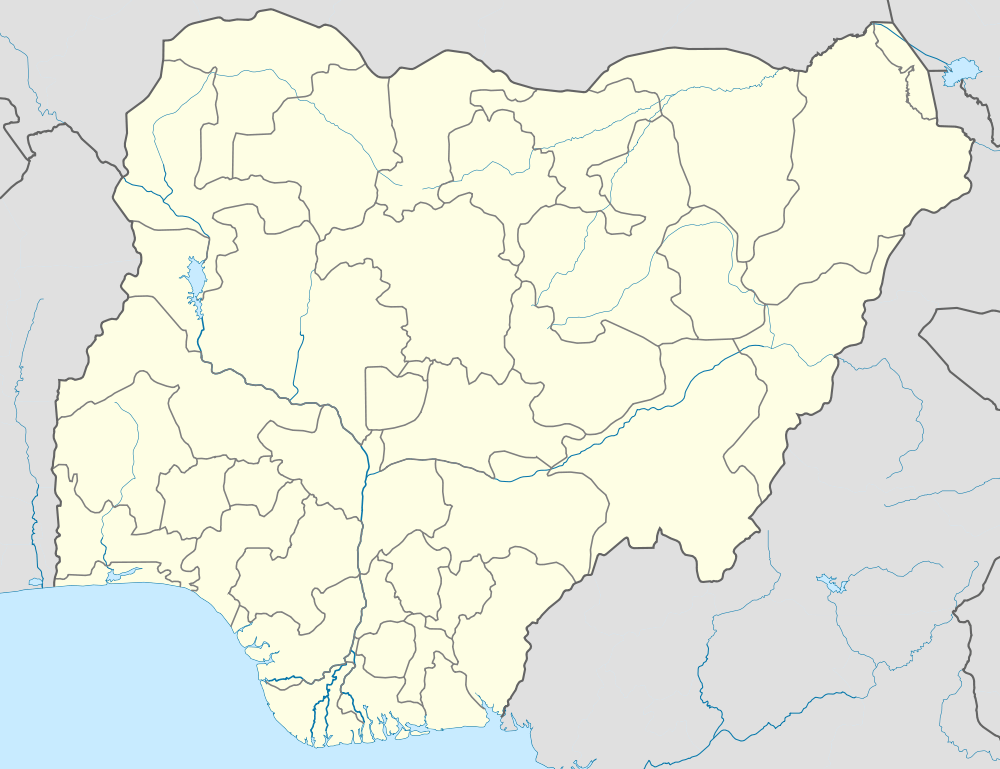Bade Emirate
Coordinates: 12°52′5″N 11°2′47″E / 12.86806°N 11.04639°E
| Bade Emirate | |
|---|---|
| Nigerian traditional state | |
 Bade Emirate | |
| Coordinates: 12°52′5″N 11°2′47″E / 12.86806°N 11.04639°E | |
| Country |
|
| State | Yobe State |
The Bade Emirate is a traditional state with headquarters in Gashua, Yobe State, Nigeria. Alhaji Abubakar Umar Suleiman is the 11th Emir of Bade (Mai Bede), of the Bedde dynasty, turbaned on 12 November 2005.[1]
The Bade people are thought to have migrated to the area around 1300 CE, coming around the north of Lake Chad from Kanem.[2] In 1808 the Bade, then subject to the Bornu Empire, were attacked by Fulani jihad warriors, who were expanding their control across Northern Nigeria. The emirate became independent in 1818 when Mai Lawan Babuje detached the Emirate from the Kanuri of Bornu and fortified Gorgorum as the capital of an independent state. The state remained independent until the end of the century, when it fell to the Sudanese warrior Rabih az-Zubayr. Following Rabih's death, in 1902 the British confirmed the independence of the Emirate.[3]
Rulers
Rulers of the Emirate:[4]
| Title | Reign | Name | Birth/death |
|---|---|---|---|
| Mai Bedde | Dugum Bugia | ||
| Mai Bedde | Dugum Akuya dan Bugia | ||
| Mai Bedde | to 1842 | Lawan Babuje dan Dugum Akuya | (d. 1842) |
| Mai Bedde | 1842 - 1893 | Al-Hajji dan Babuje | (d. 1893) |
| Mai Bedde | 1893 - 1897 | Duna dan al-Hajji | |
| Mai Bedde | 1897 - 1904 | Salih dan al-Hajji | (d. 1919) |
| Emir | 1904 - 1919 | Salih dan al-Hajji | (see above) |
| Emir | 1920 - 1941 | Sulayman dan Salih | |
| Emir | 1942 - 1945 | Mai Umara dan al-Hajji | (d. 1945) |
| Emir | 1945 - 1981 | Mai Umar dan Sulayman | (b. 1919 d. 1981) |
| Emir | 1981 - 2005 | Mai Saleh Ibn Suleiman II (OFR) | (b. 1925 d. 2005) |
| Emir | 2005 - | Mai Abubakar Umar Suleiman | (b. January 1962)[1] |
References
- ↑ 1.0 1.1 Njadvara Musa (November 14, 2005). "Ibrahim swears in new emir in Yobe". BNW News. Retrieved 2010-09-11.
- ↑ "ASSALAMU ALAIKUM (Welcome)". Bade Emirate council. Retrieved 2010-09-11.
- ↑ Muḥammad Zuhdī Yakan (1999). Almanac of African peoples & nations. Transaction Publishers. pp. 192–193. ISBN 1-56000-433-9.
- ↑ "Traditional States of Nigeria". WorldStatesmen. Archived from the original on 26 September 2010. Retrieved 2010-09-04.